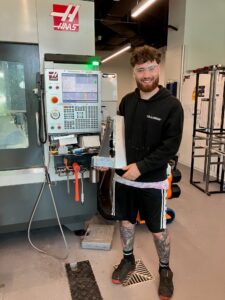Morson Maker Space – A Blueprint for Future-Ready, Inclusive Education
16th June 2025, 4:08 pm
A powerful partnership between the University of Salford and Morson Group is transforming how students learn, collaborate, and innovate—putting industrial collaboration at the heart of teaching and research, a brand-new report has revealed.
The Maker Space, created as result of the partnership, is supporting the UK government’s call to make STEM more inclusive and engaging. Maker Space is a dynamic hub where students from all disciplines apply theory to practice—gaining hands-on experience with advanced tools such as 3D printers, digital fabrication equipment, and CAD systems. Through project-based learning and collaborative problem-solving, students develop the critical skills demanded by tomorrow’s industries today.
A new Impact Report, published today, offers a clear and detailed evaluation of the University of Salford’s Maker Space, with an extensive analysis conducted by Challenge Multimedia, highlighting the Maker Space’s central role in removing barriers to STEM education.
Ged Mason OBE, CEO of Morson Group, commented: “The Maker Space is a powerful example of how education and industry can come together to shape the future of skills. It’s not just about technology – it’s about access, opportunity, and inspiring the next generation. Morson Group are proud to foster an initiative that not only equips students with real-world, industry-ready capabilities but also champions curiosity, inclusivity, and social mobility. Through our Salford University partnership, we’re helping to create a talent pipeline that reflects the diversity of our communities and meets the evolving demands of the UK’s STEM sectors. This Impact Report shows how investing in spaces like this delivers long-term value for individuals, employers, and the wider economy.”
By creating an accessible, hands-on learning environment, the space encourages broader participation and enables all students to develop the skills and confidence they need to thrive.
“The Maker Space is no longer optional—it’s essential,” said Andy Hassall, Director of Business Development at Morson Projects while Dr Maria Stukoff, Director of the Maker Space, states, “We see a profound transformation in students who engage with the Maker Space—technically, creatively, and personally.”
The Impact Report not only highlights the Maker Space’s central role in removing barriers to STEM education but directly supporting the UK government’s call to make STEM more inclusive and engaging. Designed for full accessibility, the Maker Space fosters a strong sense of belonging—empowering students from all backgrounds to participate, contribute, and lead in STEM innovation.
Students consistently credit the Maker Space with accelerating their growth and bridging the gap between university and industry. “Engineering is all about applying ideas—and that’s what the Maker Space enables,” one student shared. Another added: “I learned how to work like an engineer, not just a student.” With a growing community and sustained investment in cutting-edge equipment, staff expertise, and outreach, the Maker Space remains at the forefront of inclusive, hands-on education at Salford. Its model proves that when education is practical, collaborative, and accessible—it empowers every learner to succeed.
Professor Nic Beech, Vice-Chancellor of the University of Salford add his support: “We are deeply committed to the University’s Maker Space, which embodies our dedication to hands-on, collaborative learning and inclusive STEM education. Our partnership with Morson Group showcases how accessible, industry-connected environments inspire students to explore, build confidence, and realise their potential. With its open-door policy and strong industry links, the Maker Space shapes graduates who are ready for future challenges. It is a hub of innovation and a key driver of educational excellence, social mobility, and community engagement—empowering students to make a lasting impact in Salford and beyond.”

Gerry Mason / Morson Celebration at the new SEE Building, Maker Space, University of Salford

Next Article
Greater Manchester’s firms can drive a transformative period of growth for the region